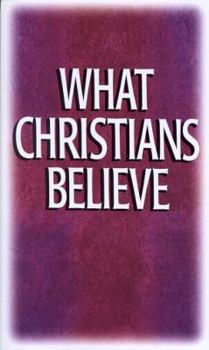What Christians Believe
Select Format
Select Condition 
Book Overview
The Essentials ExplainedMaster storyteller and essayist C. S. Lewis here tackles the central questions of the Christian faith: Who was Jesus? What did he accomplish? What does it mean for me?In these... This description may be from another edition of this product.
Format:Paperback
Language:English
ISBN:0802493785
ISBN13:9780802493781
Release Date:September 1952
Publisher:Moody Publishers
Length:128 Pages
Weight:0.21 lbs.
Dimensions:0.4" x 4.2" x 7.0"
Customer Reviews
4 ratings
<*))))>< An Introduction to Christianity
Published by Thriftbooks.com User , 16 years ago
"We are told that Christ was killed for us, that His death has washed out our sins, and that by dying He disabled death itself. That is the formula. That is Christianity." ~ pg. 67 "What Christians Believe" is a tiny book that explains the very basics of Christianity. C. S. Lewis presents his arguments in a logical way with plenty of illustrations to make his points. This book is perfect for anyone who is seeking the truth or who wants to know more about why Jesus had to die for humanity's sins. As soon as I finished reading this book I bought two copies for friends. This would be perfect as a gift for anyone who wants an introduction to C. S. Lewis' work. ~The Rebecca Review
Excellent Read
Published by Thriftbooks.com User , 17 years ago
An excerpt from Mere Christianity, this tiny book summarizes in a very succinct manner what Christians believe. As a former atheist, Lewis provides a logical train of thought for those who might be looking for a straightforward approach to the joys of Christianity.
Basic Christianity
Published by Thriftbooks.com User , 18 years ago
Beautifully written, logical explanation of basic Christian beliefs. It is very easy to read and follow his thought process. You could easily read it in one sitting. This would be a great tool for sharing with friends who are not Christians but have questions. It is actually only one chapter out of Lewis' classic "Mere Christianity."
Common beliefs
Published by Thriftbooks.com User , 19 years ago
C.S. Lewis was a rare individual. One of the few non-clerics to be recognised as a theologian by the Anglican church, he put forth the case for Christianity in general in ways that many Christians beyond the Anglican world can accept, and a clear description for non-Christians of what Christian faith and practice should be. Indeed, Lewis says in his introduction that this text (or indeed, hardly any other he produced) will help in deciding between Christian denominations. While he describes himself as a 'very ordinary layman' in the Church of England, he looks to the broader picture of Christianity, particularly for those who have little or no background. The discussion of division points rarely wins a convert, Lewis observed, and so he leaves the issues of ecclesiology and high theology differences to 'experts'. Lewis is of course selling himself short in this regard, but it helps to reinforce his point. This book derives from his work, 'Mere Christianity', a book looks at beliefs, both from a 'natural' standpoint as well as a scripture/tradition/reason standpoint. Lewis looks both at belief and unbelief - for example, he states that Christians do not have to see other religions of the world as thoroughly wrong; on the other hand, to be an atheist requires (in Lewis' estimation) that one view religions, all religions, as founded on a mistake. Lewis probably surprised his listeners by starting a statement, 'When I was an atheist...' Lewis is a late-comer to Christianity (most Anglicans in England were cradle-Anglicans). Thus Lewis can speak with the authority of one having deliberately chosen and found Christianity, rather than one who by accident of birth never knew any other (although the case can be made that Lewis was certainly raised in a culture dominated by Christendom). Lewis also looks at practice - here we are not talking about liturgical niceties or even general church-y practices, but rather the broad strokes of Christian practice - issues of morality, forgiveness, charity, hope and faith. Faith actually has a very brief section - part of it looking at the more common use of system of belief, but another part examining faith in a more subtle, spiritual way. Lewis states early that should readers get lost, they should just skip the chapter - while many parts of Christianity will be accessible and intelligible to non-Christians, some things cannot be understood from the outside. This is the 'leave it to God' sense of faith, that is in many ways more of a gift or grace from God than a skill to be developed. Finally, Lewis looks at personality, not just in the sense of our individual personality, but our status as persons and of God's own personality. Lewis' conclusion that there is no true personality apart from God's is somewhat disquieting; Lewis contrasts Christianity with itself in saying that it is both easy and hard at the same time. Lewis looks for the 'new man' to be a creature in complete submission and abandonment to God.





